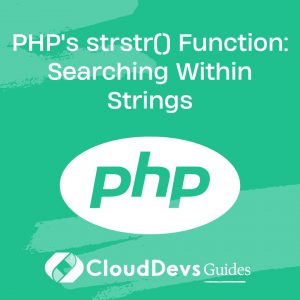Unlocking the Power of PHP’s array_filter() Function
In PHP, handling and manipulating arrays is a common task in many web development scenarios. One powerful tool for managing arrays is the array_filter() function. This function allows you to filter elements of an array based on a callback function, making it easier to work with complex data sets and streamline your code.
What is array_filter()?
The array_filter() function filters elements of an array using a callback function. The callback function determines which elements to keep based on a condition you define. This function returns a new array containing only the elements that pass the callback test.
Syntax:
```php array_filter(array $array, callable $callback = null, int $flag = 0): array ```
- $array: The input array to be filtered.
- $callback: A callback function to use for filtering. If no callback is provided, all entries of the input array with a non-false value will be included in the result.
- $flag: A flag to modify the behavior of the callback function.
Basic Usage
Here’s a simple example to demonstrate how array_filter() works:
```php
$numbers = [1, 2, 3, 4, 5, 6, 7, 8, 9, 10];
// Define a callback function to filter out even numbers
function is_odd($number) {
return $number % 2 !== 0;
}
// Use array_filter with the callback function
$odd_numbers = array_filter($numbers, 'is_odd');
print_r($odd_numbers);
```
Output:
```php
Array
(
[0] => 1
[2] => 3
[4] => 5
[6] => 7
[8] => 9
)
```
In this example, array_filter() filters out even numbers, leaving only odd numbers in the resulting array.
Using Anonymous Functions
You can also use anonymous functions (closures) with array_filter(), which is often more concise:
```php
$numbers = [1, 2, 3, 4, 5, 6, 7, 8, 9, 10];
// Use an anonymous function to filter out odd numbers
$even_numbers = array_filter($numbers, function($number) {
return $number % 2 === 0;
});
print_r($even_numbers);
```
Output:
```php
Array
(
[1] => 2
[3] => 4
[5] => 6
[7] => 8
[9] => 10
)
```
Advanced Usage: Using Flags
The $flag parameter can modify the behavior of array_filter(). For example, using ARRAY_FILTER_USE_KEY allows you to filter based on array keys:
```php
$assoc_array = [
'a' => 1,
'b' => 2,
'c' => 3,
'd' => 4,
];
// Filter array by keys
$filtered_array = array_filter($assoc_array, function($key) {
return $key === 'a' || $key === 'c';
}, ARRAY_FILTER_USE_KEY);
print_r($filtered_array);
```
Output:
Array
(
[a] => 1
[c] => 3
)
```
Practical Examples
Filtering Non-Empty Values:
```php $data = ["apple", "", "banana", null, "cherry"]; // Remove empty values $filtered_data = array_filter($data); print_r($filtered_data); ```
Output:
```php
Array
(
[0] => apple
[2] => banana
[4] => cherry
)
``` Filtering Users Based on Age:<br /><br />
```php
$users = [
['name' => 'Alice', 'age' => 25],
['name' => 'Bob', 'age' => 30],
['name' => 'Charlie', 'age' => 20],
];
// Get users older than 25
$filtered_users = array_filter($users, function($user) {
return $user['age'] > 25;
});
print_r($filtered_users);
```
Output:
```php
Array
(
[1] => Array
(
[name] => Bob
[age] => 30
)
)
```
Conclusion
The array_filter() function in PHP is a versatile tool for filtering array elements based on specific conditions. Whether you’re working with simple arrays or more complex associative arrays, array_filter() can simplify your code and make data processing more efficient.
Further Reading
Table of Contents








